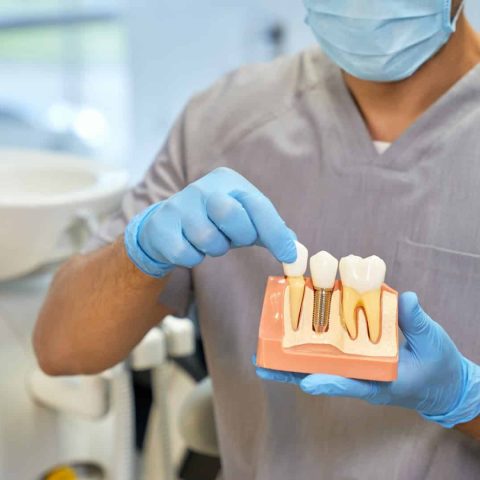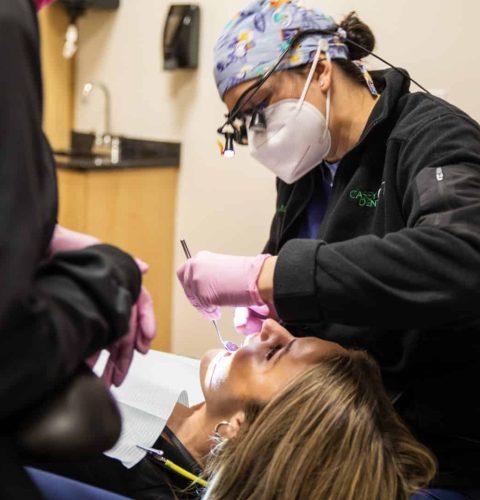Tooth Extractions in Pittston, PA

Pittston Tooth Extractions
The dentists at Casey Dental perform tooth extractions as one of our many dental services. Our team of dentists will help you to determine if an extraction is the best course of action and will answer any questions you may have. Contact us today to schedule an appointment.
When is a tooth extraction necessary?
Though preserving natural teeth is our goal, extracting teeth is sometimes necessary. Individual teeth are sometimes extracted when the patient has a toothache and suffers from severe decay, infection, or periodontal disease.
Another common extraction we perform is removing wisdom teeth. Wisdom teeth are often impacted or crowded and can degrade or become infected. Our patients often choose to have them taken out proactively.
Sometimes, a tooth may need to be removed for proper alignment before placing dentures, implants, or beginning orthodontic treatment.

Preparing for a Tooth Extraction
Tooth extraction is a safe and routine procedure, but you can do a few things to ensure it goes smoothly:
- Brush and floss your teeth before your appointment. This will help to remove any food particles that could cause infection.
- Be prepared to rest and take the rest of the day easy following your procedure. Eat soft foods, avoid straws, take over-the-counter pain relievers as recommended, and drink lots of water which helps your body to heal. Our office can provide a letter for your job or school if needed, and resting will help your body begin the healing process.
- Be prepared for some discomfort after the extraction. Your gums will be sore, and you may experience some bruising. However, these short-term side effects should subside within a few days.
Interested in Tooth Extractions in Pittston, PA?
Recovery Following a Tooth Extraction
After tooth extraction, it is essential to take good care of the wound to promote healing and avoid complications. Initially, you may experience heavy bleeding, but this can be controlled by biting on a moist gauze pad for 15-20 minutes. Here are a few tips for recovery from an extraction:
Protect the Blood Clot
After dental extraction, one of the most important things is to protect the clot that forms in the empty socket. The blood clot is a barrier that protects the bone and nerve endings from exposure. It also helps reduce bleeding and promote healing.
There are a few different ways to protect the clot. First, avoid drinking through a straw or smoking, as these can cause suction and dislodge the clot. You should also take care around the extraction area when brushing your teeth or rinsing your mouth, as vigorously swishing around can also disturb the clot.
Keep the Extraction Site Clean
Once a tooth is extracted, it’s essential to take care of the extraction site. First, rinse your mouth with warm water several times daily and after eating. When brushing your teeth, be gentle and ensure not to irritate the gum tissue at the extraction site. You should also avoid smoking or using tobacco products while your mouth heals.
Eat Only Soft Foods
After having a tooth pulled, you will need to take care of your mouth and choose foods that promote healing. Choose soft foods that don’t require much chewing. Good choices include pudding, yogurt, applesauce, mashed potatoes, oatmeal, soup, and eggs. Avoid hard or crunchy foods that can cause pain or bleeding. It’s also best to avoid hot foods and drinks as they can irritate the open wound. Try to chew food away from the site if possible.
Replacement Options
In addition to the emotional challenges and cosmetic problems, tooth extraction can lead to functional issues, such as difficulty chewing or speaking. Luckily, there are several options available for treating tooth loss. Dental implants are one popular choice, as they look and function like natural teeth. They are also a permanent solution to tooth loss.
Bridges and dentures are also common choices that are far less invasive than dental implants. While they require replacement every 5-7 years, they typically require far less money upfront. However, they also require more upkeep and maintenance since they are not permanent fixtures in your mouth. Ultimately, the best option for treating tooth loss depends on your needs and preferences.

Set an Appointment
As a trusted dental provider, Casey Dental is proud to provide our patients in Luzerne County with the highest quality dental care. If you need a tooth extraction, we can help. Our experienced professionals will care for you and ensure your experience is as comfortable as possible. So, give us a call today to set an appointment.
We look forward to helping you achieve optimal oral health!




